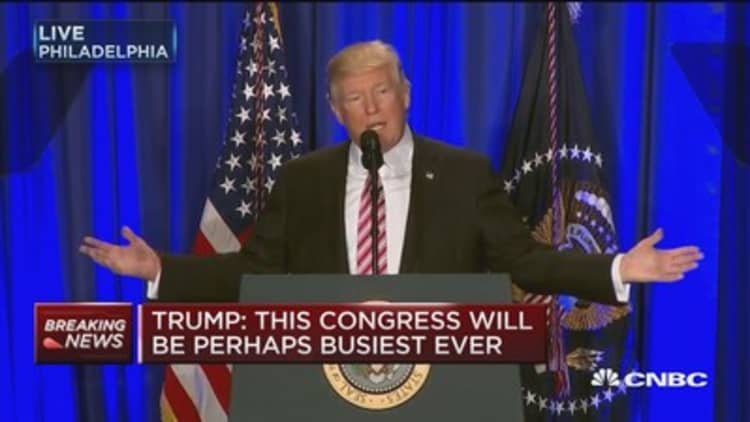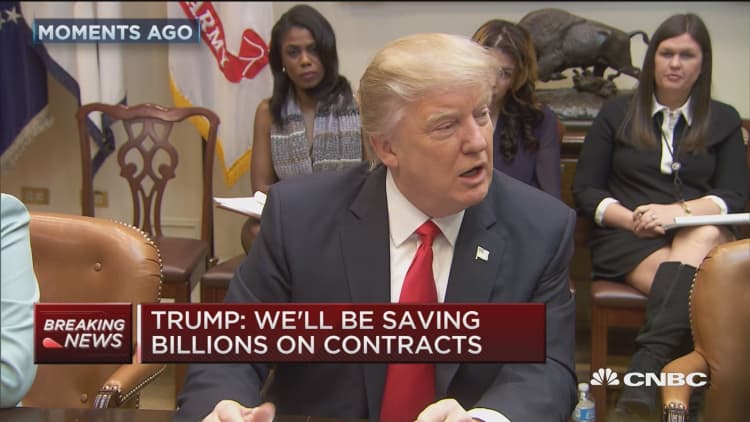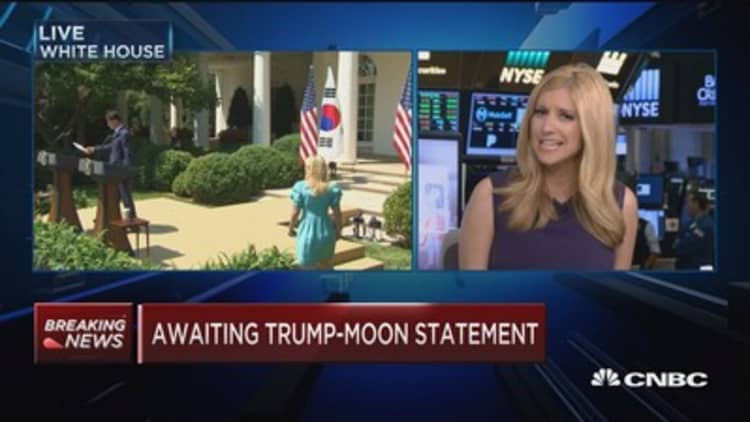During his first six months in office, President Donald Trump frequently told the story of how he spontaneously came up with an idea to force energy companies to build pipelines with American-made steel and pipes.
The anecdote drew applause at rallies as Trump explained how his proposal would put American laborers to work making the steel and fabricating the pipes that transport the nation's oil and gas.
But in the six months since a deadline for the plan passed, Trump has dropped the idea from his stump speech and rarely mentions the plan.
Now, the pipeline operators who oppose the made-in-America requirement and the steelmakers who support it are left to wonder whether it has dropped off the agenda.
"The broad issues of trade and the U.S. relationship with U.S. trading partners continues. What we haven't seen is specific action on pipelines and pipeline steel and pipes specifically," said John Stoody, vice president of government and public relations at the Association of Oil Pipe Lines.

The association was monitoring the release of Trump's infrastructure plan last week for an update, but when it went public, there was no mention of the rule.
Critics say the requirement would raise costs for pipe makers and pipeline operators. They warn it could delay or kill projects, cost American jobs and spark a trade war.
Steelmakers generally take a different view, saying American mills have the capacity to produce the steel, and the rule would create jobs in those mills. But they, too, are awaiting word from the White House.
"This made-in-America pipeline requirement just went radio silent," said Philip Bell, president of the Steel Manufacturers Association.
Asked if it was still under consideration, a White House spokesperson said there is "no announcement to make on this front."
Trump drops the pipeline story
But at least some stakeholders believe this is a case of a president who went very public with a policy idea only to realize that it was unworkable after getting input from both sides of the debate.
"They won't say that because no administration ever admits fault," said a representative from an industry group that opposes the rule who asked not to be named so he could speak candidly.
"They're not going to say we kind of got out in front of our skis."
The White House declined to respond about that comment.
There were signs of trouble from the start. Just weeks after president's announcement, the White House conceded that the two pipelines that sparked the idea would get a waiver because one was mostly built and pipe for the other had already been sourced.
At one point, while discussing why U.S. pipes would be superior to foreign ones, Trump inaccurately described how the pipes are made and shipped.

A full retreat would fall squarely on the shoulders of the president, who took extraordinary ownership of the plan.
In Trump's telling, he was all set to sign a pair of presidential memos approving the controversial Keystone XL and Dakota Access pipelines blocked by his predecessor, when a question suddenly occurred to him. Where will the raw steel and pipes for these projects be made?
Trump said the answer did not satisfy him so he scrawled another line on the spot ordering the Commerce Department to draw up a plan that would require pipelines built within the United States to use American supplies.
The plan drew swift backlash from some conservatives who saw it as government interference in free market decisions. Those and other concerns surfaced in letters submitted to the department during a public comment period set up to inform the agency's report to the president. Its deadline was July 23. Commerce officials told CNBC two days before that it would meet the deadline. The report has not been made public.
Two days later, Trump held a rally in Youngstown, Ohio. He did not mention the idea. He has held four rallies since then, and while he has boasted about approving Keystone XL and Dakota Access in several of them, he did not mention the made-in-America rule at any.
Trump touted the idea in four of his five rallies prior to receiving Commerce's report, including at his June 21 speech in Cedar Rapids, Iowa.
Not dead yet?
To be sure, this is not proof that Trump has dropped the plan.
During a White House meeting last week with lawmakers, Democratic Sen. Ron Wyden of Oregon expressed concern that the infrastructure plan would allow states to walk back commitments to using U.S. steel. In response, Trump brought up his approval of Keystone XL and Dakota Access.
"When I approved them, I said, 'Where's the steel being made?' And they told me a location that did not make me happy. And I wrote down that from now on steel is being made for pipelines, as you know, it's got to be made in the United States. And it's got to be fabricated in the United States. And so I'm a believer in that also."
Bell, the steel association president, says the president's impending decision on whether to slap tariffs on imported steel and aluminum could present another opportunity to resurface the plan. There was no mention of the plan in the Commerce Department's tariff recommendations to the president released on Friday.
Bell also believes the final infrastructure plan should require projects built by public-private partnerships to use American-made products.
Stoody from the pipeline association says the industry is pleased with Trump's efforts to streamline federal permitting under the infrastructure plan, but it will continue to watch for updates on the made-in-America requirement.
"Things are going well and [Trump's] overall goal of improving the economy, improving opportunities for American workers has succeeded, so we certainly would hate to see a turn to something that might threaten jobs for American construction workers building pipelines," Stoody said.
WATCH: Former US trade rep says steel tariff not a good idea



